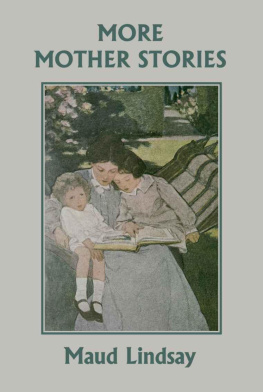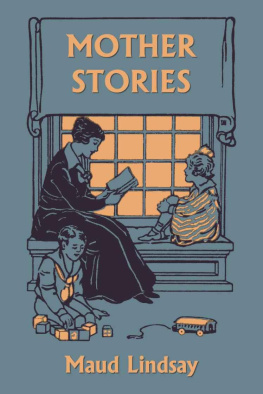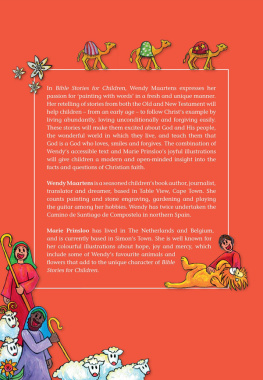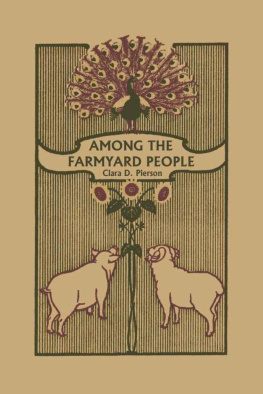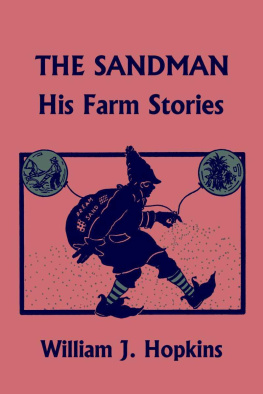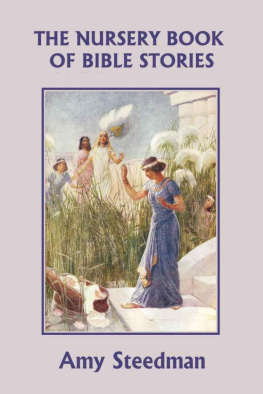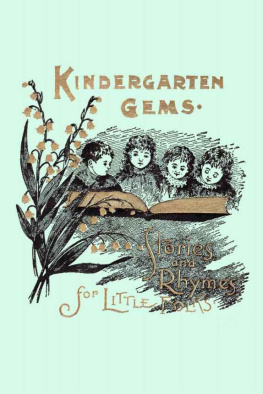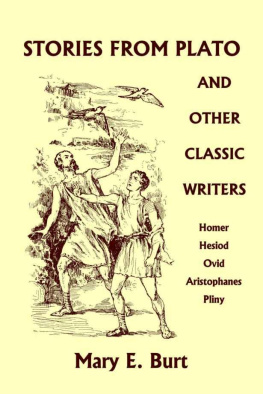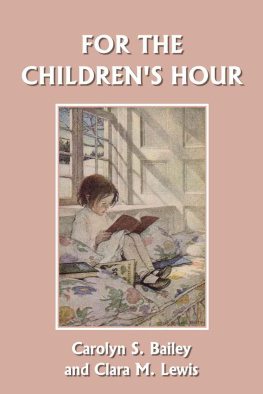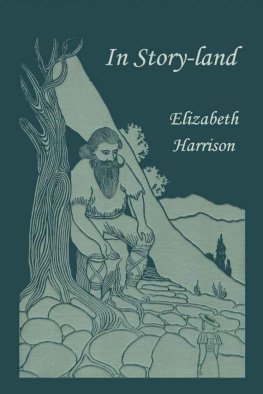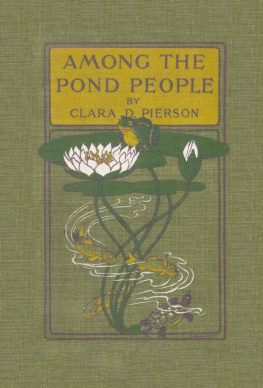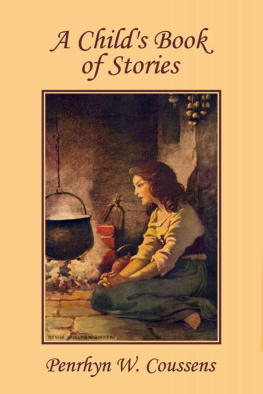More Mother Stories
by
Maud Lindsay
Yesterday's Classics
Chapel Hill, North Carolina
Cover and Arrangement 2010 Yesterday's Classics, LLC
All rights reserved. No part of this book may be reproduced or retransmitted in any form or by any means without the written permission of the publisher.
This edition, first published in 2010 by Yesterday's Classics, an imprint of Yesterday's Classics, LLC, is an unabridged republication of the work originally published by Milton Bradley Company in 1905. This title is available in a print edition (ISBN 978-1-59915-168-7).
Yesterday's Classics, LLC
PO Box 3418
Chapel Hill, NC 27515
Yesterday's Classics
Yesterday's Classics republishes classic books for children from the golden age of children's literature, the era from 1880 to 1920. Many of our titles are offered in high-quality paperback editions, with text cast in modern easy-to-read type for today's readers. The illustrations from the original volumes are included except in those few cases where the quality of the original images is too low to make their reproduction feasible. Unless specified otherwise, color illustrations in the original volumes are rendered in black and white in our print editions.
Preface
Preface
Piping down the valleys wild, Piping songs of pleasant glee, On a cloud I saw a child, And he laughing said to me: "Pipe a song about a lamb." |
"Pipe a song about a lamb." "Tell a story about a pony." The plea of universal childhood is for joyful "intimacy with the life of Nature." Poets, painters, writers, the lovers of children of all times and nations, have responded to this childish longing, but it remained for Friedrich Froebel to interpret it, and to recognize its spiritual value. "Each child has a vision of his own inmost life in the mirror of Nature," he writes in his commentary on the Play of Beckoning the Chickens, and again in the motto for The Little Maiden and the Stars:
"All that is noble in your child is stirred, And every energy to action spurred, By Nature's silent oft-repeated word." |
His Mother Play Book is full of Nature. We find the child pictured there playing in field and meadow, wading in running brook, plucking flowers, calling chickens, watching pigeons, living with Nature, and growing toward God.
Alas that there are children to whom such joys are denied, but even in them, the little dwellers in city streets, we find this love of Nature strong whenever we give them opportunity to manifest it. I was once in a kindergarten of city children when a homely gray kitten strayed into their midst. Oh, the lighting up of little faces, the reaching out of little hands, the sympathetic interest that thrilled their little hearts at the sight!
"Pipe a song about a lamb." My stories of the happy outdoor world were written in response to the needs of the little children with whom my lot is cast. They were suggested to me by the Mother-Plays, and I have striven, though faultily, to keep them true to Froebel's ideals for childhoodTruth, Simplicity, and Purity.
The story writer, however, has but small part in the art of story making for the young child. It is the story teller who gives life and glow to the story, and it is with the hope that you who tell my simple tales will supply their deficiencies and make them sweet that I am sending this little volume forth.
M AUD L INDSAY.
Tuscumbia, Alabama, 1905.
Contents
Motto for the Mother
Wishes are lost in empty air
Unless the wisher does his share;
And fairy gift will always be
But golden opportunity.
Early teach your child to see
That golden opportunity
Waits not for him, but he must be
Waiting for opportunity.
Wishing Wishes
A Story for the All Gone Song
O NCE upon a time two little boys sat on a doorstep wishing wishes.
ONCE UPON A TIME TWO LITTLE BOYS SAT ON A DOORSTEP WISHING WISHES.
"I wish, I wish," said the first little boy, whose name was Billy, "I wish I had something to eat as good as ice-cream!"
"So do I," said the other little boy, whose name was Bobbie, "and a rose as red as my sister's new Sunday dress."
"Yes, indeed," said Billy, "and a pony to ride."
"Oh, yes," cried Bobbie, clapping his hands, "a real, live pony to ride away"
And then they both cried "Oh!" For, do you believe it? there right before them stood the tiniest, the loveliest lady they had ever seen!
Her hair was like sunshine, her eyes like the skies, and her cheeks like roses; and she had wings more beautiful than the wings of a butterfly; for she was a fairy.
"I am your fairy godmother," said she, "and I will grant your three wishes if you will do just as I tell you."
Billy and Bobbie had never known before that they had a fairy godmother; but they were very glad of it, and listened eagerly to all she said.
"Get up in the morning when the stars are growing pale," said the fairy godmother, "and be at my golden gates when the lark sings his first song."
"But how shall we find your golden gates?" cried Billy and Bobbie together.
Then the fairy godmother put her hand into her pocket and took out two tiny feathers.
"Blow these into the air," she said, as she gave one to each child, "and follow them wherever they go; and when they fall to the earth again you will find my golden gates near by."
Then, before the little boys had time to answer, she vanished from sight, and only a bright spot of sunshine showed where she had stood.
Billy laid his feather down on the door- step and ran to look for her, and when he came back the feather was gone, for a breeze had blown by and whisked it away; and though Billy ran after it he never could catch it.
"Now, there!" he said, "that horrid breeze has blown away my feather, and how shall I find my fairy godmother's golden gates?"
"Never mind," said Bobbie, "I have my feather safe in my handkerchief; and if you will get up early in the morning you can go with me."
"All right," cried Billy; and both the little boys ran home to tell their mothers the wonderful thing that had happened to them.
When Bobbie got to his home and had told his mother and eaten his supper, he made haste to go to bed; for he knew that he must be up betimes the next morning. He folded his clothes on a chair, tied the feather up loosely in the handkerchief and pinned the handkerchief to his jacket, that everything might be ready when he waked up.
Early, early in the morning, when the stars were pale, he jumped up and dressed, and ran to Billy's house.
"Billy! Billy!" he called, as soon as he got there; but Billy was asleep. He had not gone to bed with the birds, and he did not hear Bobbie call until his big brother waked him up; and then he said:
"Oh! I'm too sleepy to go now. Tell Bobbie to go on and I will catch up with him."
So Bobbie started off alone. When he reached the road he shook out his handkerchief, and away flew the feather over the fields and meadows where the dewdrops waited for the sunbeams to make them bright. Bobbie followed it wherever it went, and by and by it flew near the lark's nest. The lark was just getting up.
"Good morning," said Bobbie. "When will you sing your first song?"
"When I fly up to the blue sky," answered the lark; and he flew up, up, till he looked like a tiny speck against the sky, and then he sang his morning song.

